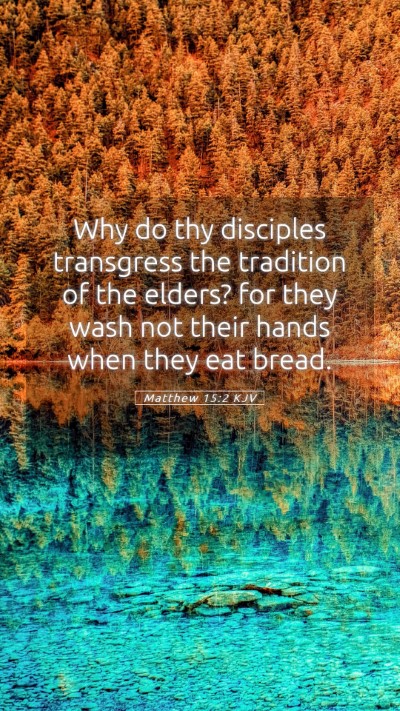Bible Verse Meaning: Matthew 15:2
Verse: "Why do thy disciples transgress the tradition of the elders? For they wash not their hands when they eat bread." (Matthew 15:2)
Overview
This verse captures a significant moment where the Pharisees confront Jesus regarding the behavior of His disciples. The issue at hand is one of tradition versus the commandments of God. The Pharisees are concerned with ritual cleanliness rather than the purity of the heart, challenging the disciples' adherence to established customs.
Insights from Public Domain Commentaries
-
Matthew Henry's Commentary
Henry emphasizes that the Pharisees prioritized human traditions over divine commandments. They criticized Jesus' disciples for not washing their hands, which was a ceremonial practice rather than a moral imperative. This indicates a hypocrisy in placing tradition above the true spirit of the law. Henry points out that while tradition has its place, it should never supersede God's laws.
-
Albert Barnes' Notes on the Bible
Barnes interprets this verse as showcasing the legalistic mindset of the Pharisees. He suggests that their focus on external rituals blinded them to the inner truth of God’s commandments. Barnes argues that true worship comes from a heart dedicated to God rather than mere adherence to tradition. The criticism serves as a reflection of how human regulations can conflict with the essence of faith.
-
Adam Clarke's Commentary
Clarke offers insight into the cultural context of the time. He explains that the act of washing hands before meals was rooted in Jewish purity laws that aimed to keep the community sanctified. However, Clarke highlights Jesus' response, which progressively challenged these traditions, indicating a shift towards a new covenant where the heart's condition matters more than ritualistic acts.
Key Themes and Interpretations
-
Tradition vs. Commandment:
This passage illustrates the tension between human traditions and the commandments of God. Jesus redirects the focus from rituals to the heart’s intentions.
-
The Heart of Worship:
True worship is about inner purity and sincerity rather than merely following rituals. This profound realization is central to understanding Jesus’ teachings.
-
Hypocrisy of the Pharisees:
Jesus exposes the hypocrisy of the Pharisees, who upheld traditions while neglecting the deeper moral and ethical standards of the law.
-
Historical Context:
Understanding the historical and cultural context of Jewish customs helps illuminate why this confrontation was significant and how it challenges contemporary practices.
Application to Daily Life
In applying the insights from Matthew 15:2, individuals are encouraged to reflect on their own practices of faith. It provokes questions such as:
- Do I prioritize rituals over relationships with God and others?
- How can I ensure my worship is genuine and rooted in love rather than legalism?
- What traditions do I hold that may be obscuring the true heart of the Gospel?
Related Bible Cross References
- Mark 7:5-8 - Further discussion on traditions over God's commandments.
- Isaiah 29:13 - Prophecy of honoring God with lips while hearts are far away.
- Matthew 23:25-28 - Jesus’ strong admonition against external appearances without inner purity.
Final Thoughts
The verse Matthew 15:2 serves as a rich focal point for Bible study insights and reflects the essential nature of our relationship with God. The enduring message is a call to prioritize the condition of our hearts over mere adherence to traditions. In understanding this scripture, one can gain a more profound Bible verse interpretation and apply its lessons in meaningful, practical ways in everyday life.
Whether through online Bible study or in Bible study groups, seeking to understand the intention behind such teachings can lead to a more authentic expression of faith and a deeper connection to God's commandments.


